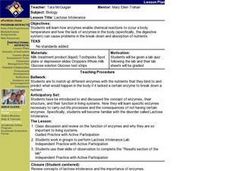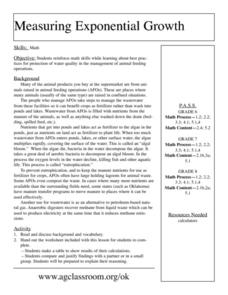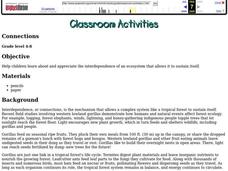Curated OER
Non-nutrients: Fiber and Water
Students will identify the sources and function of carbohydrates and fiber and apply appropriate food preparation techniques.
Curated OER
Essential Nutrients - Daily Guides
List the recommended dietary guidelines and explain their function and implementation. (The guidelines are listed below) National Standards 14.3.1 Aim for fitness Aim for a healthy weight Be physically active each day
Curated OER
From One End to the Other
Seventh graders become more familiar with how our food is broken down mechanically and chemically. They also trace the food through the alimentary canal.
Curated OER
Health Benefits of Rice
Sixth graders examine the health benefits of rice. In this food benefits lesson, 6th graders discover the nutritious benefits of rice. Students research Celiac Sprue disease and how rice benefits the people with this disease.
Curated OER
What Makes a Habitable Planet?
Young scholars list conditions necessary for humans to survive. They then mix yeast with a nutrient broth consisting of warm water and table sugar in a plastic bottle, capping it with a party balloon and compare the factors within the...
Curated OER
Water
Students examine water, its function and how much you should consume. In this water lesson students study water and why it is important, how much you should drink and what its functions are in your body.
Curated OER
Dirt Life
Students select and collect soil samples from a variety of locations (schoolyard, home, etc.). They do this lab after an interest-generating discussion about "dirt" and microbes. Students make a dilution in sterile water, plate it on a...
Curated OER
Lactose Intolerance
Students are taught how enzymes enable chemical reactions to occur a body temperature and how the lack of enzymes in the body can cause problems in the break-down and absorpion of nutrients. They match up different enzymes with the...
Curated OER
Cows, Worms, and Compost
Students study decomposition. In this decomposition lesson, students discuss the background information about decomposition. Students then complete the 'Chew It Twice' worksheet.
Curated OER
The Human Organism
Students identify their feelings and learn constructive ways of handling conflict. In this human mental health lesson, students identify their feelings, learn how to tell others about their feelings, and learn how to resolve conflict....
Perkins School for the Blind
The Function of Villi in the Small Intestine
Ever wonder what the villi in the small intestine do? I bet your class would love to find out. Mesh netting is used to represent small blood vessels on the outside of the intestine, and a chenille bath mat is used to represent the villi...
Curated OER
Testing for Life’s Molecules
Want to hear a joke about sodium? Na. Young scientists test various materials to identify if they include protein, starch, and glucose by using the Biuret test, iodine starch test, and Benedict's test respectively. After practicing with...
Consortium for Ocean Science Exploration and Engagement (COSEE)
Carbon Dioxide & Krill: Impacts
What effects do temperature and carbon dioxide levels have on the zooplankton of Antarctica? This concluding lesson plan in a short unit on climate change and the ocean helps environmental scientists answer these questions. After...
Curated OER
A Design You’ll Dig: Designing a Habitat for Worms
Middle schoolers discover how worms contribute to the balance of the environment. In this composting lesson, students study the composting and decomposition processes. Middle schoolers then create habitats for worms that allow them to do...
Curated OER
Steps to a Healthier You
Students explore the food pyramid. In this dietary health lesson, students examine the food pyramid on the MyPyramid.gov website and discuss healthy eating strategies. There are various links to websites in this lesson.
Curated OER
F.B.I.
Students create a worm bin full of fruit and vegetable scraps wit paper and observe what happens over time. In this decomposers lesson plan, students observe that the fruit and vegetable scraps become new soil.
Curated OER
Earthworm Animation
Young scholars use animation to create their own earthworm catching and eating its prey. They must draw storyboards before they start on the animation.
Curated OER
Measuring Exponential Growth
Middle schoolers reinforce math skills while learning about best practices
for protection of water quality in the management of animal feeding
operations. They make a table to show results of their calculations and compare and justify...
Curated OER
Hunger and Malnutrition
Students recognize that our bodies cannot function without certain essential foods. In this hunger and malnutrition lesson, students become familiar with the problems associated with malnutrition such as medical problems, problems...
Curated OER
CONNECTIONS
Students study the interdependence of an ecosystem that allows it to sustain itself. They examine the Western lowland gorillas for an example.
Curated OER
Those Amazing Earthworms- A Worm's World
Young scholars investigate earthworms. In this organisms lesson, students observe earthworms in their environment and record their behavior towards light and how they eat. Young scholars continue on a month long observation.
Curated OER
They Don't Just Eat Grass
Middle schoolers consider the USDA daily recommendations to create a "feed" product for middle schoolers. In this Health lesson, students learn about the ingredients in feed that is fed to livestock and apply the method to creating feed...
Curated OER
Worm Composting
Second graders discuss worm composting. In this decomposition lesson, 2nd graders look at the anatomy of the worm and how it eats food. They have their own worm bin and review what foods can and can not be given to the worms for...
Curated OER
Carbohydrates-Simple and Complex
Grain products are staple foods and sources of simple and complex carbohydrates that provide energy for the body. Define simple and complex carbohydrates Identify function and sources of simple and complex carbohydrates Describe how...

























